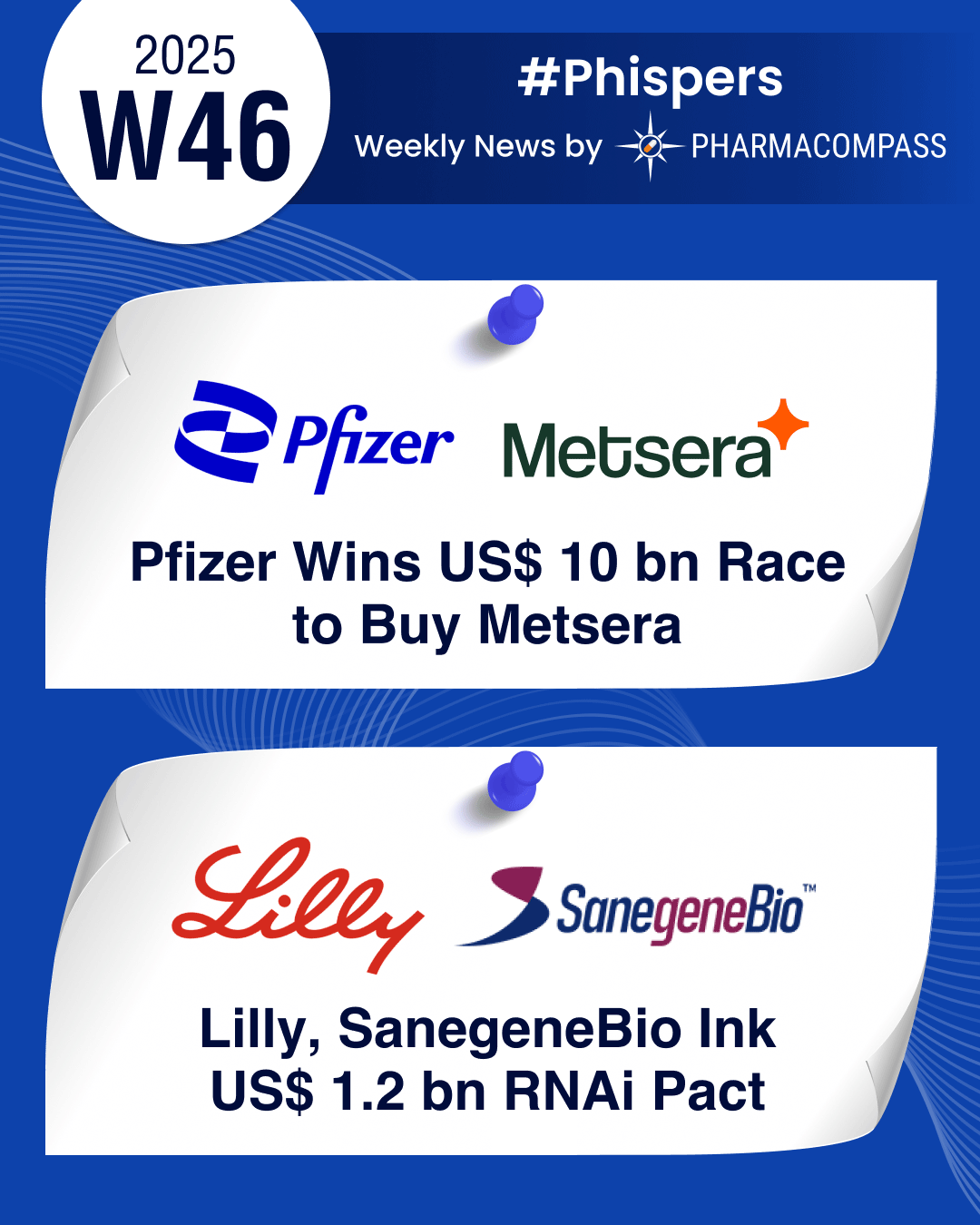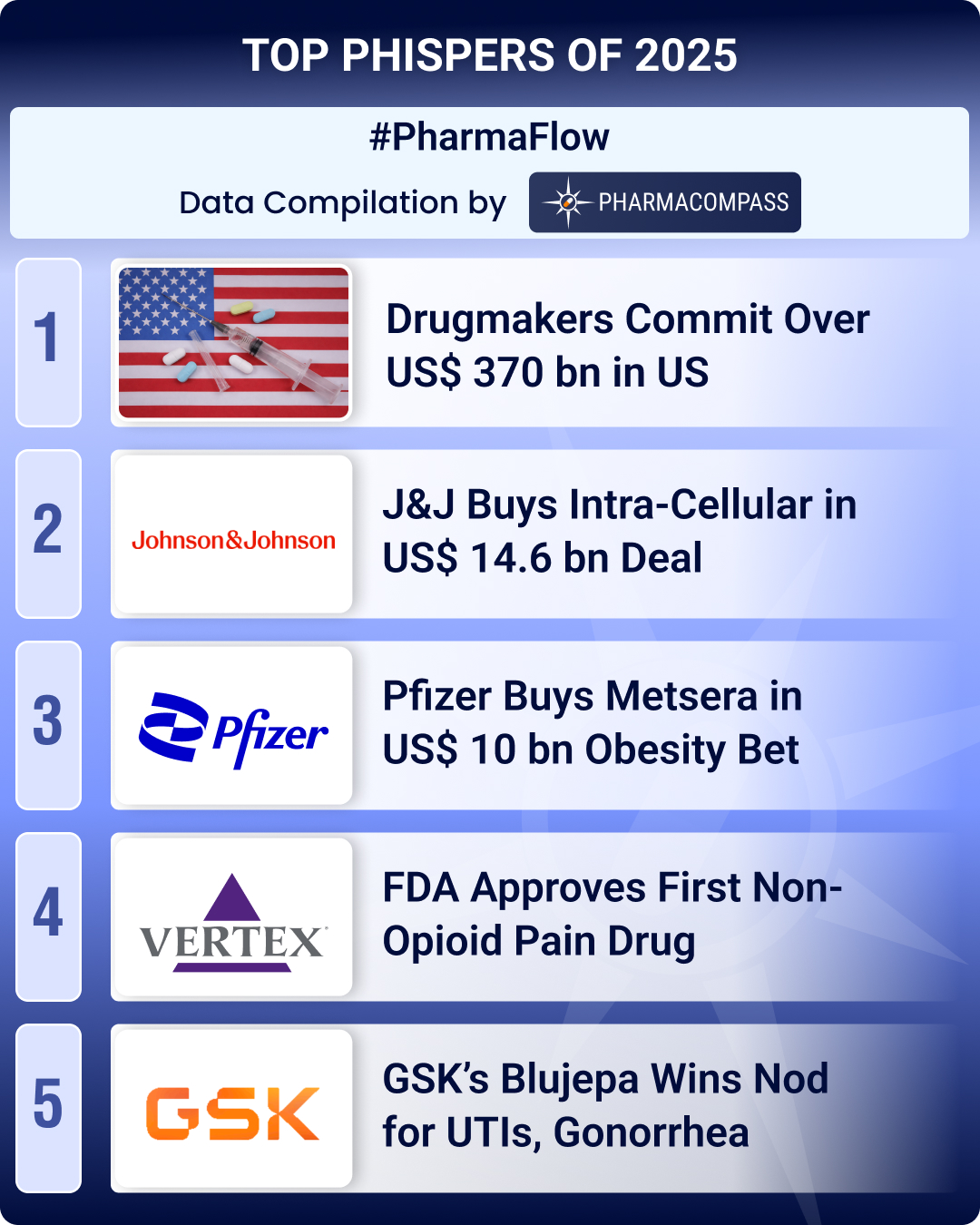Phispers On Air
Click & Listen

By PharmaCompass
2025-11-13
Impressions: 1,106 Article || 110 Video || 28 Listen
In Phispers this week, Pfizer won its high stakes battle with Novo Nordisk for the obesity-focused biotech Metsera. The deal is worth up to US$ 10 billion.
Eli Lilly signed a partnership worth up to US$ 1.2 billion with SanegeneBio to develop long-acting RNAi-based treatments for metabolic diseases.
The US Food and Drug Administration (FDA) lifted its long-standing black box warning on hormone replacement therapies for menopause. The agency also unveiled a new “plausible-mechanism” approval pathway that will allow personalized treatments for rare and life-threatening genetic diseases.
In approvals, FDA approved Johnson & Johnson’s Darzalex Faspro as the first therapy for high-risk smoldering multiple myeloma. Meanwhile, oncology veteran Richard Pazdur was appointed head of FDA’s Center for Drug Evaluation and Research (CDER).
In clinical trials, Genentech’s fenebrutinib achieved success in a late-stage multiple sclerosis trial, Amgen’s Repatha (in combination with statins) cut first-time cardiovascular events by 25 percent, and CeleCor’s zalunfiban showed promise in preventing major complications in patients with the most severe form of heart attacks.
In oncology, American biotech Cogent Biosciences reported positive phase 3 data for its gastrointestinal stromal tumor (GIST) combination therapy, while Neuphoria Therapeutics received a buyout offer from hedge fund Lynx1 following a late-stage trial setback.
Pfizer clinches up to US$ 10 bn deal for obesity-focused Metsera after Novo bows out
Pfizer has secured an up to US$ 10 billion agreement to acquire Metsera, ending a high-stakes bidding war with Novo Nordisk for control of the obesity-focused biotech. Metsera accepted Pfizer’s sweetened offer, citing potential US antitrust hurdles that complicated Novo’s rival bid. The development comes after Novo offered US$ 10 billion, which was considerably higher than Pfizer’s revised bid of US$ 8.1 billion. Pfizer had taken the matter to courts. It had filed lawsuits against Metsera, its board, and Novo Nordisk, alleging that Metsera breached its earlier merger agreement and accused Novo of structuring its bid to block Pfizer’s entry into the fast-growing obesity market.
Eli Lilly partners with SanegeneBio in up to US$ 1.2 bn RNAi deal
Eli Lilly has entered into a global research and licensing partnership with SanegeneBio, a Boston-based biotech developing RNA interference (RNAi) therapeutics, in a deal worth up to US$ 1.2 billion. The collaboration aims to advance RNAi-based therapies for metabolic diseases using SanegeneBio’s proprietary Ligand and Enhancer Assisted Delivery platform, which enables tissue-selective and long-acting RNAi delivery, potentially allowing dosing as infrequently as twice a year.
FDA clears J&J’s Darzalex Faspro as first treatment for high-risk multiple myeloma
FDA has approved Johnson & Johnson’s Darzalex Faspro (daratumumab and hyaluronidase-fihj) for adults with high-risk smoldering multiple myeloma (SMM), making it the first and only therapy for the early, asymptomatic stage of the blood cancer. SMM is a precursor to multiple myeloma (a cancer that affects plasma cells) and about half of high-risk patients progress to active disease within two-to-three years. Darzalex Faspro is already approved for multiple myeloma and light-chain amyloidosis, a rare blood disorder.
Removes black box warning from hormone therapies: FDA has lifted the strictest “black box” warnings from hormone replacement therapies used to treat menopause symptoms, reversing a 22-year-old decision that had sharply curtailed their use. FDA Commissioner Marty Makary called the reversal a “historic day for women in the US”.
Pazdur to head CDER: FDA has appointed Richard Pazdur, long-time head of its Oncology Center of Excellence, as director of the Center for Drug Evaluation and Research (CDER), which is the agency’s division overseeing most prescription drugs. Pazdur, an FDA veteran credited with streamlining cancer drug reviews and advancing global regulatory collaborations such as Project Orbis, succeeds George Tidmarsh, who resigned earlier this month amid an internal ethics investigation.
New approval pathway for personalized therapies: FDA has unveiled a new “plausible-mechanism” approval pathway that will allow personalized treatments for rare and life-threatening genetic diseases to be cleared based on data from only a few patients. Under the new approach, companies can seek approval if early studies, though small, show clear biological plausibility and meaningful clinical benefit in several consecutive patients. The pathway will initially focus on rare and fatal childhood disorders, but may extend to other diseases.
Genentech’s experimental MS drug hits primary goal in late-stage trial
Genentech, part of Roche, said its experimental multiple sclerosis (MS) drug, fenebrutinib, met its main goal in a phase 3 study in patients with relapsing MS. The treatment significantly reduced annualized relapse rates as compared to Aubagio (teriflunomide) over 96 weeks. The Swiss drugmaker also reported that fenebrutinib was non-inferior to its own Ocrevus in a separate trial for primary progressive MS (PPMS). If approved, analysts estimate the drug could exceed US$ 1 billion in annual peak sales.
Cogent’s combo therapy for gastro cancer scores trial win: Cogent Biosciences’ experimental cancer therapy bezuclastinib, used alongside approved treatment sunitinib, delivered strong phase 3 results in patients with gastrointestinal stromal tumor (GIST) whose disease had progressed after earlier treatment. The combo more than doubled response rates and significantly prolonged survival compared to sunitinib alone. If approved, the combination could become a new standard of care for second-line GIST.
CeleCor’s rapid heart-attack treatment shows promise in late-stage study
American biotech CeleCor Therapeutics’ investigational heart-attack drug, zalunfiban, met its main goals in a phase 3 trial involving patients with ST-segment elevation myocardial infarction (STEMI), the most severe form of heart attack. When given by first responders at the first point of medical contact, the subcutaneous anti-platelet injection improved blood flow to the heart and cut the risk of major complications.
Amgen’s drug cuts risk of major heart events: Amgen has reported positive phase 3 results showing that Repatha (evolocumab), when added to statins or other cholesterol-lowering therapies, significantly reduced the risk of major cardiovascular events in adults without a prior heart attack or stroke.
Hedge fund makes buyout offer for Neuphoria after phase 3 trial failure
American clinical stage biotech Neuphoria Therapeutics has received an unsolicited offer from Puerto Rico-based hedge fund Lynx1 Master Fund to acquire all outstanding shares of the company for US$ 5.20 each in cash. The bid comes shortly after Neuphoria’s lead program for social anxiety disorder failed in a phase 3 trial, prompting the biotech to begin a strategic review. Neuphoria has said its board will evaluate the offer alongside other strategic options.
The PharmaCompass Newsletter – Sign Up, Stay Ahead
Feedback, help us to improve. Click here
Image Credit : Phispers Infographic by PharmaCompass license under CC BY 2.0
“ The article is based on the information available in public and which the author believes to be true. The author is not disseminating any information, which the author believes or knows, is confidential or in conflict with the privacy of any person. The views expressed or information supplied through this article is mere opinion and observation of the author. The author does not intend to defame, insult or, cause loss or damage to anyone, in any manner, through this article.”







